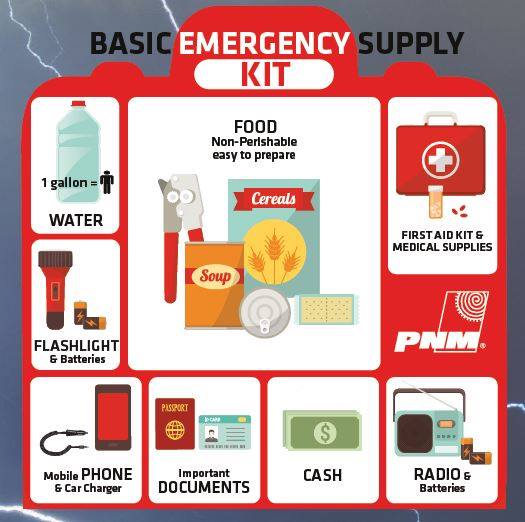Storm Safety - pnmprod
Storm Safety
Severe storms can occur any time of year. Be prepared for storms and know how to stay safe.
- Having an outage kit at your home or business is a great way to stay prepared in the event of an outage. Consider the following items for your kit:

- Consider the need for specialty items in your kit, such as prescription medication, baby food, pet food, additional warm clothing and a safe heat source.
- If you experienced a storm/outage and used any of your supplies in your outage kit, replenish those supplies in preparation for potential future storms.
- Keep a portable radio, TV or NOAA Weather Radio on hand to monitor official weather forecasts and other important information for your area.
- Have a backup plan to move yourself and your family, especially those with medical needs, to an alternate location in case you have to evacuate or experience an extended power outage.
- Homeowners who depend on well water should draw an emergency water supply in case power to their electric water pumps is interrupted.
- If you have an emergency heating or power source, learn how to use it properly well before storm season.
- Stay away from downed or sagging power lines. Consider all downed power lines and anything touching them energized and dangerous! Do not get near them and report the problem by calling PNM immediately at 888-DIAL-PNM.
- Keep children and family pets away from areas where lines may have fallen (backyards, fields, school yards, etc.).
- During an outage, don't open freezers and refrigerators any more than absolutely necessary. Opening these appliances will allow food to thaw more quickly.
- During severe weather or power outages, turn off as many appliances and electronics as possible. After the power is restored, to help avoid damage, wait around 10 minutes before turning them back on.
- If a power line falls across a car that you're in, stay in the car and call 911. If you MUST get out of the car due to a fire or other immediate life-threatening situation, do your best to jump clear of the car and land on both feet. Be sure that no part of your body is touching the car when your feet touch the ground.
- Snow and ice accumulations on overhead power lines can cause the lines to break and fall to the ground. Stay away from any lines that may have fallen, and call PNM.
- Understand that in areas of the state that are prone to severe winter weather, having alternate means of warming your residence, and extra food and water is important. Snow and mud may prevent us from quickly reestablishing service, especially in remote areas.
Understanding how power is restored
During an outage and or/storm, our crews' first priority is to make sure the scene is safe, assess the damage, and then start the restoration efforts. In the case of a major, widespread storm, this assessment can take time. During this phase, you may see our trucks in your neighborhood as you continue to experience an outage. The information they gather helps us plan our work.
In an outage situation, addressing hazardous situations such as downed wires is priority, as we work on restoring as many customers as we can, as safely and quickly as possible. We also prioritize repairs that restore service to critical facilities such as hospitals, water pumping stations, and police and fire departments.
As we work to restore power to all customers, you may see your neighbor's lights on, while your location remains in the dark. Different parts of a neighborhood may be on different circuits, and not all circuits are restored at the same time. Sometimes, a problem only affects service to your home.
Whenever you experience an outage, please report it by calling 888-DIAL-PNM, in the Outage Center here on our website, or text #OUT to 78766.



